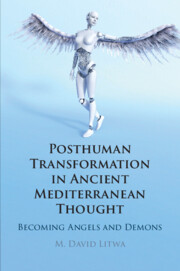2 results
Chapter 8 - The Angelification of Zostrianos
-
- Book:
- Posthuman Transformation in Ancient Mediterranean Thought
- Published online:
- 24 December 2020
- Print publication:
- 07 January 2021, pp 133-150
-
- Chapter
- Export citation

Posthuman Transformation in Ancient Mediterranean Thought
- Becoming Angels and Demons
-
- Published online:
- 24 December 2020
- Print publication:
- 07 January 2021


